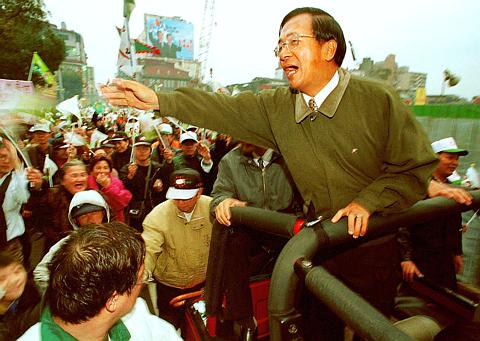In his attempt to engage China before the upcoming Chinese New Year, DPP presidential candidate Chen Shui-bian (
Chen also reaffirmed that the DPP would like to resume cross-strait negotiations. The presidential hopeful said that he would even be open to discussing the "one China" policy, so long as it was not a pre-condition for dialogue.
"Unless China attempts to use force, the DPP will never declare the independence of Taiwan unilaterally, or even call for a referendum on the issue," Chen said. "In addition, we will not put the `two-states' formula into the Constitution. If I am the new president, any change in the current status of Taiwan would be decided by all Taiwanese people."

PHOTO: AP
Chen stressed that Taiwan has already become an independent, sovereign country, so there is no need to take up the question of whether Taiwan is independent. Similarly, there is no need for Taiwan to change its official name.
If both sides approached talks with "the presuppositions of `peaceful resolution' and `reciprocal treatment,' the one China policy could also be discussed," he said.
These comments formed the basis of two of the "seven points" that Chen elaborated yesterday, which marked the fifth anniversary of Chinese President Jiang Zemin's (
In his seven points, Chen appealed to Chinese leaders to avoid making references to a "military resolution" to the conflict between Taiwan and China.
Chen's third point advocated the restoration of negotiations and dialogue to normalize cross-strait relations as soon as possible.
"In addition to official channels, we welcome any other new measures to help establish reliable communication between Taiwan and China," he said.
In his fourth point, Chen suggested that both sides' leaders should sign a peaceful treaty and invited officials to visit each other.
"We can talk about any issue, such as implementing `confidence-building measures' [and] lifting the restrictions on the so-called `three links' on certain conditions," he said.
Chen's fifth point contained a vow to help China democratize and modernize.
In his sixth point, Chen said that both sides should participate in the international community under the auspices of the World Trade Organization to develop peace and prosperity for Taiwan and China.
Finally, Chen reaffirmed in his seventh point that he would like to visit China after the presidential election and before his inauguration if he wins. He likewise invited Chinese leaders to visit Taiwan.
The KMT said Chen's statement was a concession to China, but it did not eliminate people's anxiety about a possible war if Chen wins the election.
"A few days ago, when he talked on President Jiang's eight points, China's Vice Premier Qian Qichen (
"So Chen apparently made a concession on his party's independent stance. Chen tried to create a theory of passive independent conditions, but he still failed to ease the worries of Chinese leaders."
See also Editorial inside

A magnitude 7.0 earthquake struck off Yilan at 11:05pm yesterday, the Central Weather Administration (CWA) said. The epicenter was located at sea, about 32.3km east of Yilan County Hall, at a depth of 72.8km, CWA data showed There were no immediate reports of damage. The intensity of the quake, which gauges the actual effect of a seismic event, measured 4 in Yilan County area on Taiwan’s seven-tier intensity scale, the data showed. It measured 4 in other parts of eastern, northern and central Taiwan as well as Tainan, and 3 in Kaohsiung and Pingtung County, and 2 in Lienchiang and Penghu counties and 1

FOREIGN INTERFERENCE: Beijing would likely intensify public opinion warfare in next year’s local elections to prevent Lai from getting re-elected, the ‘Yomiuri Shimbun’ said Internal documents from a Chinese artificial intelligence (AI) company indicated that China has been using the technology to intervene in foreign elections, including propaganda targeting Taiwan’s local elections next year and presidential elections in 2028, a Japanese newspaper reported yesterday. The Institute of National Security of Vanderbilt University obtained nearly 400 pages of documents from GoLaxy, a company with ties to the Chinese government, and found evidence that it had apparently deployed sophisticated, AI-driven propaganda campaigns in Hong Kong and Taiwan to shape public opinion, the Yomiuri Shimbun reported. GoLaxy provides insights, situation analysis and public opinion-shaping technology by conducting network surveillance

‘POLITICAL GAME’: DPP lawmakers said the motion would not meet the legislative threshold needed, and accused the KMT and the TPP of trivializing the Constitution The Legislative Yuan yesterday approved a motion to initiate impeachment proceedings against President William Lai (賴清德), saying he had undermined Taiwan’s constitutional order and democracy. The motion was approved 61-50 by lawmakers from the main opposition Chinese Nationalist Party (KMT) and the smaller Taiwan People’s Party (TPP), who together hold a legislative majority. Under the motion, a roll call vote for impeachment would be held on May 19 next year, after various hearings are held and Lai is given the chance to defend himself. The move came after Lai on Monday last week did not promulgate an amendment passed by the legislature that

AFTERMATH: The Taipei City Government said it received 39 minor incident reports including gas leaks, water leaks and outages, and a damaged traffic signal A magnitude 7.0 earthquake struck off Taiwan’s northeastern coast late on Saturday, producing only two major aftershocks as of yesterday noon, the Central Weather Administration (CWA) said. The limited aftershocks contrast with last year’s major earthquake in Hualien County, as Saturday’s earthquake occurred at a greater depth in a subduction zone. Saturday’s earthquake struck at 11:05pm, with its hypocenter about 32.3km east of Yilan County Hall, at a depth of 72.8km. Shaking was felt in 17 administrative regions north of Tainan and in eastern Taiwan, reaching intensity level 4 on Taiwan’s seven-tier seismic scale, the CWA said. In Hualien, the